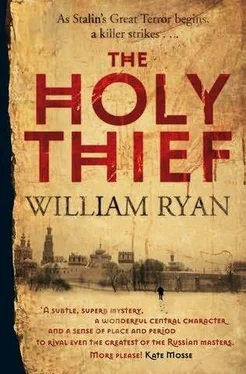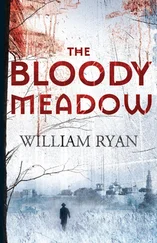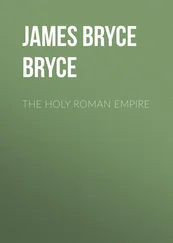William Ryan - The Holy Thief
Здесь есть возможность читать онлайн «William Ryan - The Holy Thief» весь текст электронной книги совершенно бесплатно (целиком полную версию без сокращений). В некоторых случаях можно слушать аудио, скачать через торрент в формате fb2 и присутствует краткое содержание. Жанр: Исторический детектив, на английском языке. Описание произведения, (предисловие) а так же отзывы посетителей доступны на портале библиотеки ЛибКат.
- Название:The Holy Thief
- Автор:
- Жанр:
- Год:неизвестен
- ISBN:нет данных
- Рейтинг книги:4 / 5. Голосов: 1
-
Избранное:Добавить в избранное
- Отзывы:
-
Ваша оценка:
- 80
- 1
- 2
- 3
- 4
- 5
The Holy Thief: краткое содержание, описание и аннотация
Предлагаем к чтению аннотацию, описание, краткое содержание или предисловие (зависит от того, что написал сам автор книги «The Holy Thief»). Если вы не нашли необходимую информацию о книге — напишите в комментариях, мы постараемся отыскать её.
The Holy Thief — читать онлайн бесплатно полную книгу (весь текст) целиком
Ниже представлен текст книги, разбитый по страницам. Система сохранения места последней прочитанной страницы, позволяет с удобством читать онлайн бесплатно книгу «The Holy Thief», без необходимости каждый раз заново искать на чём Вы остановились. Поставьте закладку, и сможете в любой момент перейти на страницу, на которой закончили чтение.
Интервал:
Закладка:
They joined the queue to view the corpse. This being a Bolshevik funeral, there would be no priest, nor any ceremony as such. Popov and others would make speeches at the graveside, of course, but there was no set form to mark Semionov’s passing. The only thing that was certain was that Korolev’s involvement would be minimal. He was under strict instructions in that regard.
“You’re not speaking, are you?” Popov asked, as if he could hear Korolev’s thoughts and the question sounded more like an order than anything else.
“I’ve been advised that my health does not permit it.”
“Indeed,” Popov said, running his finger absent-mindedly down a mosaic. “I’ve been told to keep it short, myself.” He nodded toward the stained altar and the coffin. “If I’d been consulted, of course, I might have advised against having it held here. Did you know?”
“No.”
“Nor did I-just a number and the street on the announcement. You’d have thought he would have mentioned he was a member here when we found the nun-but then he didn’t tell us much, as it turns out, did he? A pity, this whole affair-he’d have made a useful investigator if he’d been allowed to continue with us.”
Their conversation had led them to the coffin and Korolev found himself contemplating Semionov’s gray face, thinner than he remembered and now soft, almost flabby, except where the cheekbones and nose held the skin taut. He leaned down and kissed the boy’s forehead, and then pushed a loose hair away from the smooth skin. Without a soul, Semionov’s body was nothing-an empty box that smelled like the sea at low tide. He felt a tear itch the corner of his eye and wondered at the futility of such a young life coming to a full stop.
The room had filled up, he saw, as he moved on from the coffin. And he couldn’t help but notice the grim-faced men in good-quality military-style tunics muttering in the corners-Chekists, Korolev presumed.
“There’ll be a medal for him. And for you. They’re trying to decide what.” The general smiled. “They want to reward you for unmasking the traitors, but quietly. The shoot-out on Vorontsovo Pole never happened, as you know.”
“Colonel Rodinov informed me.”
The general sat down in one of the ranked chairs and pointed Korolev to another.
“You’re to forget about the whole business. The NKVD will be tying up any loose ends. And this time, Alexei Dmitriyevich, please understand this is an absolute prohibition.”
“I understand,” Korolev said, although there was one loose end he planned to deal with personally, whatever anyone said.
“Good. You don’t know how lucky you are, Korolev. Ezhov wanted everyone concerned with the case shot-just to avoid contamination. If God existed, which of course he doesn’t, I’d say he was on your side. Do you know what happened? Stalin was out walking in the Kremlin gardens when the kolkhoz village floated overhead and it amused him. That’s all. That was the dividing line between life and death. If it hadn’t amused him, or if Gregorin had run the other way, or if the soldiers had held onto the ropes, or if a hundred other things had or hadn’t happened-well, you’d be dead. And so, almost certainly, would I.”
Korolev tried to imagine Stalin laughing at an inflatable village floating across Moscow and found it difficult.
“We were lucky a breeze blew up later on, though,” the general said, almost to himself. “He probably wouldn’t have stayed amused if they’d had to cancel the air force’s contribution to the parade.”
Korolev nodded, remembering squadron after squadron of bombers flying above Moscow-a demonstration of Soviet strength on the nineteenth anniversary of the Revolution. They sat in silence, contemplating the ridiculous nature of fate.
“What happened in the end? To the village?” Korolev asked.
“They shot most of it down. Apparently one building got away. There are sightings of it. They say it’s heading toward Finland.”
“I wonder if it will make it,” Korolev said, thinking of Gregorin’s plans to cross the Finnish border.
There was a shuffle of movement near the entrance and they followed everyone’s gaze to see who had caused such a stir. Korolev recognized Rodinov immediately and, at first, thought the reaction of the crowd was for the colonel, but then he noticed the small man beside him, walking with a swagger that seemed out of keeping with his diminutive size. Commissar of State Security Ezhov’s bony face peered out from under a military cap and his yellow teeth flashed in a smile that didn’t reach his eyes. Everyone rose to their feet, but Ezhov waved them back down with that special gesture Stalin used-modest, but aware of his power.
Rodinov leaned to whisper in the commissar’s ear, and Ezhov nodded his agreement and took a seat at the back next to a pretty brunette in mourning black. A man joined them and Korolev felt a shiver raise the hairs on his neck as he recognized Babel. The writer nodded to him, and Korolev could have sworn he saw a twinkle in his eye as he turned his attention to Ezhov’s wife.
Rodinov had by now reached a small lectern beside the coffin and set about unfolding a sheet of paper from his pocket. He was dressed in a suit that looked specially bought for the occasion.
“Comrades,” the colonel began, looking up, “thank you for coming here today to mark the passing of the loyal Komsomol and Soviet citizen, Ivan Ivanovich Semionov. I thank you on behalf of his family, his Comrades and his fellow Komsomol members.”
There was a sob and Korolev turned to see a middle-aged woman buckled with grief. He recognized an echo of Semionov’s features in her tear-streaked face, and prayed he would never have to bury his own son.
“What more can be said about our beloved Comrade, other than that he was a cultured man, a true believer in the historical imperative of international socialism, a diligent worker in the construction of the Soviet Union, a true and loyal Komsomol who lived in a genuine fashion?”
There was more it turned out. Much more. But eventually Rodinov folded his sheet of paper and turned to the Komsomol guard of honor with a nod. The young men looked at each other in momentary confusion that closely resembled terror, and then one of them made to lift one end of the coffin lid with a questioning look. Rodinov nodded again, this time with visible irritation and, with fumbling hands, his Comrades shut poor Semionov away in his lonely pine box forever.
CHAPTER TWENTY-SEVEN
People stopped in the street to watch the young Chekist’s coffin pass, surrounded by the guard of honor, who clung to the timbered sides as the truck bounced over potholes. Some took their hats off and one or two crossed themselves. More looked at the long cortege of shiny black cars that followed it with open curiosity. Korolev couldn’t help but smile. This was a secret funeral for a Bolshevik hero and yet it couldn’t have been more visible.
Ezhov didn’t come to the cemetery. At some point his car must have turned off and taken the commissar to a more important engagement. Of the hundreds who’d attended the dry Bolshevik funeral ceremony in the church, not more than eighty persevered to the graveside.
There were some additions to the mourners, however. Schwartz stood, slightly removed from the main group, and Korolev spotted Valentina Nikolaevna by the graveside, along with Shura and Babel’s wife, and wondered where poor Natasha was-the girl had barely spoken since the terrible events of two days before. At least Valentina Nikolaevna seemed composed-and he cursed himself for the hundredth time that morning for the horror he’d brought into their lives.
It was also apparent that not one of the presumed Chekists was still in attendance, and that the atmosphere had changed as a result. Women sobbed openly and a gaggle clutched at Semionov’s mother, whether to support her, or be supported, it wasn’t clear. It was Popov’s turn to speak now, and he stood in the priest’s spot at the head of the grave. He organized the guard of honor with quiet instructions, so that they slung thick canvas bands underneath Semionov’s coffin and, when the general nodded, began to lower the body slowly into the grave. As Semionov descended, inch by inch, Popov began to speak.
Читать дальшеИнтервал:
Закладка:
Похожие книги на «The Holy Thief»
Представляем Вашему вниманию похожие книги на «The Holy Thief» списком для выбора. Мы отобрали схожую по названию и смыслу литературу в надежде предоставить читателям больше вариантов отыскать новые, интересные, ещё непрочитанные произведения.
Обсуждение, отзывы о книге «The Holy Thief» и просто собственные мнения читателей. Оставьте ваши комментарии, напишите, что Вы думаете о произведении, его смысле или главных героях. Укажите что конкретно понравилось, а что нет, и почему Вы так считаете.












